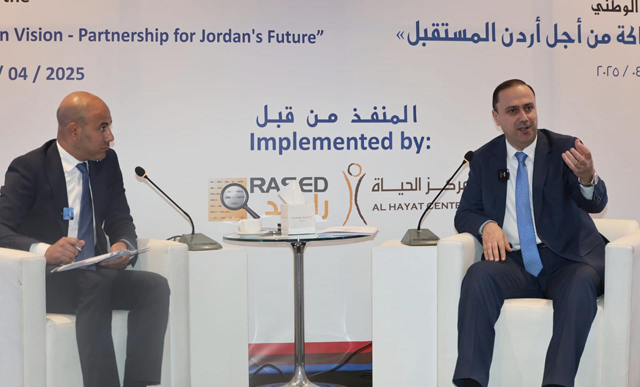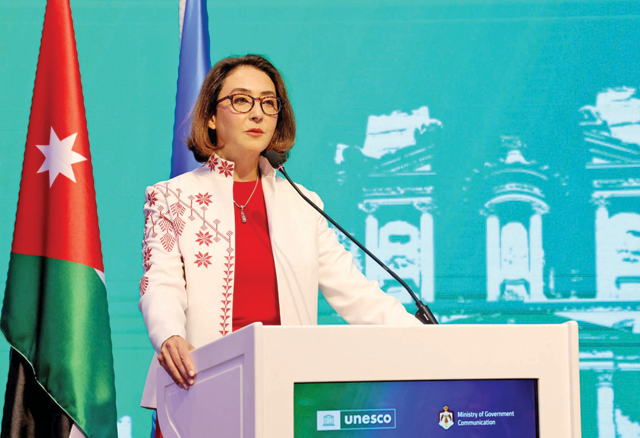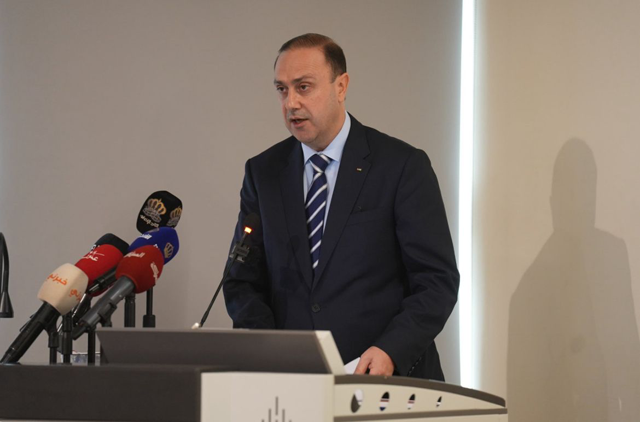You are here
Momani highlights role of media in enhancing transparency, trust
By JT - Apr 08,2025 - Last updated at Apr 08,2025

Minister of Government Communication Mohammad Momani emphasises the crucial role of transparent and timely communication in fostering lasting trust between the government and its citizens (Petra photo)
AMMAN — Minister of Government Communication Mohammad Momani emphasised the crucial role of transparent and timely communication in fostering lasting trust between the government and its citizens.
Speaking at a panel discussion titled "Media and Government Communication: An Effective Partnership with Civil Society to Enhance Transparency and Trust," Momani, who is also the government spokesperson, highlighted that government communication should be grounded in the public’s right to access information and understand state policies.
The session was part of the Economic Modernisation Vision: A Partnership for the Jordan of the Future conference, opened by Minister of State for Economic Affairs Muhannad Shihadeh, who represented Prime Minister Jaafar Hassan, the Jordan News Agency, Petra, reported.
The conference is linked to the first phase of the Nazaha project, an EU-funded initiative aimed at promoting accountability and good governance, implemented by the Hayat Centre for Civil Society Development (Rased) with support from the Spanish Agency for International Development Cooperation.
Momani outlined key principles of the government’s communication strategy, which include transparency, public engagement, and integration with national media. He stressed that the state is committed to utilising both traditional and digital media, along with public forums, to ensure broad and inclusive communication.
He also noted that the government is in the process of drafting an executive programme for 2026-2029 as part of the economic modernisation vision. This programme will be developed through institutional engagement with stakeholders and civil society across all governorates.
On the issue of misinformation and media manipulation, Momani highlighted the government’s proactive response strategy, which includes clarifying misleading content and coordinating with ministries to address misinformation. He also pointed out that the government's media system, which involves spokespersons from all ministries, helps unify the state’s message and priorities.
Momani also stressed the importance of media literacy in combating fake news and hate speech. He referenced partnerships with the Ministry of Education and Jordanian universities to integrate media literacy into both school curricula and extracurricular activities.
He also commended the Jordan Media Institute for its efforts, particularly its Media Literacy Academy, which was recently nominated for the Media and Information Literacy Award at the Mediterranean Forum for Journalism in Marseille.
Emphasising the critical role of youth, Momani said young people should be viewed not just as passive consumers of information but as active contributors to shaping the national discourse. "They are the new energy of communication," he stressed, pointing to government initiatives that engage youth in digital campaigns, public dialogues, and policy feedback.
Looking to the future, Momani said that the next step in government communication in Jordan involves developing a robust digital system, supported by artificial intelligence and data analytics, to monitor public opinion and enable real-time decision-making.
Responding to questions from the audience, Momani addressed the Palestinian cause, emphasising that support should come through tangible actions rather than symbolic gestures. He criticised recent calls for strikes as "political grandstanding" that ultimately do not serve the interests of the Palestinian people.
The minister also condemned offensive rhetoric targeting the Jordanian armed forces and security services, reaffirming Jordan’s unwavering stance in support of the Palestinian cause.
Related Articles
AMMAN — Deputising for His Majesty King Abdullah, HRH Princess Rym Ali inaugurated the 13th Global Media and Information Literacy (MIL) Week
AMMAN — Minister of Government Communication Mohammad Momani on Tuesday said that empowering youth is a strategic priority and a key pillar
AMMAN — Minister of Government Communications Mohammad Momani has stressed the critical role of science journalism in protecting societies a














